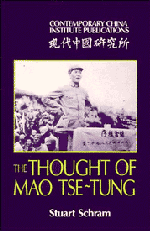Introduction
Published online by Cambridge University Press: 23 December 2009
Summary
This book is about revolution in China in the twentieth century, and Mao Tse-tung's role in shaping that revolution. Mao's influence was exerted in various guises, including the taking of decisions which determined the course of events, and also the cultivation of myths centred on his own person, especially in his later years. The most general, and probably the most lasting expression of his contribution to the Chinese revolution was, however, Mao Tse-tung's thought. My purpose is to elucidate the development of that thought, and in so doing to shed light on other aspects of Mao and of his times.
‘Ideas grow out of history; they also shape history,’ I wrote at the beginning of my first attempt at an overview of the thought of Mao Tse-tung. That proposition, while undoubtedly true, conveys far too simple and schematic a view of the problems with which we are dealing. It suggests (especially as I elaborated it two decades ago) that ideas are put together by drawing on a variety of sources, and that, having been formulated, they are then applied in order to achieve certain goals. In reality, both the content of Mao's ideas and their function were constantly changing in the course of their implementation, although there were major elements of continuity, grounded both in Mao's own nature and in China's predicament.
- Type
- Chapter
- Information
- The Thought of Mao Tse-Tung , pp. 1 - 12Publisher: Cambridge University PressPrint publication year: 1989
- 1
- Cited by



